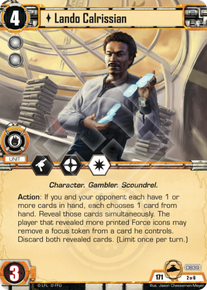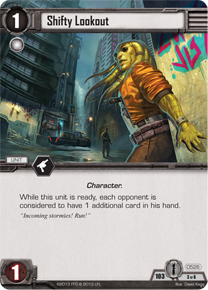

I'm being told this works even if opponent has no cards in hand.
I can't find any such thread, so plz confirm.


Best Answer Mike1977 , 25 January 2016 - 05:28 AM
So this works because the LS player is able to complete everything having/choosing/revealing/discarding a card, while the DS player only needs to meet the very first requirement?
/////////////////////////////////////////////////////////////////
IE Lando: Action: If you and your opponent each have 1 or more cards in hand, each chooses 1 card from hand. Reveal those cards simultaneously. The player that revealed more printed Force icons may remove a focus token from a card he controls. Discard both revealed cards. (Limit once per turn.)
Shifty Lookout: While this unit is ready, each opponent is considered to have 1 additional card in his hand.
Scenario: the DS player has zero cards in hand, but the LS has one or more cards in hand and a ready Shifty Lookout in play. Could Lando initiate his action and if so what would happen? Or does his action not work because you can't resolute the entire effect?
A:
In the scenario you describe (DS player with no actual cards in hand, but LS player has a Shifty Lookout on the table), Lando can trigger his action.
Each player goes to choose a card from his hand. The LS player is able to (and must) choose a card. The DS player is unable to choose an actual card, so he does not. The LS player reveals his card and, as long as the card he reveals has 1 or more printed Force icons, he would remove a focus token from a unit he controls, as per Lando’s action.
--
Erik Dahlman
LCG Developer
Fantasy Flight Games



I'm being told this works even if opponent has no cards in hand.
I can't find any such thread, so plz confirm.


So this works because the LS player is able to complete everything having/choosing/revealing/discarding a card, while the DS player only needs to meet the very first requirement?
/////////////////////////////////////////////////////////////////
IE Lando: Action: If you and your opponent each have 1 or more cards in hand, each chooses 1 card from hand. Reveal those cards simultaneously. The player that revealed more printed Force icons may remove a focus token from a card he controls. Discard both revealed cards. (Limit once per turn.)
Shifty Lookout: While this unit is ready, each opponent is considered to have 1 additional card in his hand.
Scenario: the DS player has zero cards in hand, but the LS has one or more cards in hand and a ready Shifty Lookout in play. Could Lando initiate his action and if so what would happen? Or does his action not work because you can't resolute the entire effect?
A:
In the scenario you describe (DS player with no actual cards in hand, but LS player has a Shifty Lookout on the table), Lando can trigger his action.
Each player goes to choose a card from his hand. The LS player is able to (and must) choose a card. The DS player is unable to choose an actual card, so he does not. The LS player reveals his card and, as long as the card he reveals has 1 or more printed Force icons, he would remove a focus token from a unit he controls, as per Lando’s action.
--
Erik Dahlman
LCG Developer
Fantasy Flight Games

It would be way way easier and more intuitive if they just add simple phrase there "if able" (DS reavel if able), like in good old days when you didn't needed so much official clarifications.

In effect, every aspect of every effect as a virtual "if able" on it. As in, the rules stipulate that once you've initiated an ability (ie it must be able to generate some sort of change in game state), then you must resolve all of the effect if you can, and if you can't, you must resolve as much of it as you can - ie if able. Given every aspect of an effect has a virtual "if able" on it, usually now they only go on "must" effects for clarity's sake.

In effect, every aspect of every effect as a virtual "if able" on it. As in, the rules stipulate that once you've initiated an ability (ie it must be able to generate some sort of change in game state), then you must resolve all of the effect if you can, and if you can't, you must resolve as much of it as you can - ie if able. Given every aspect of an effect has a virtual "if able" on it, usually now they only go on "must" effects for clarity's sake.

